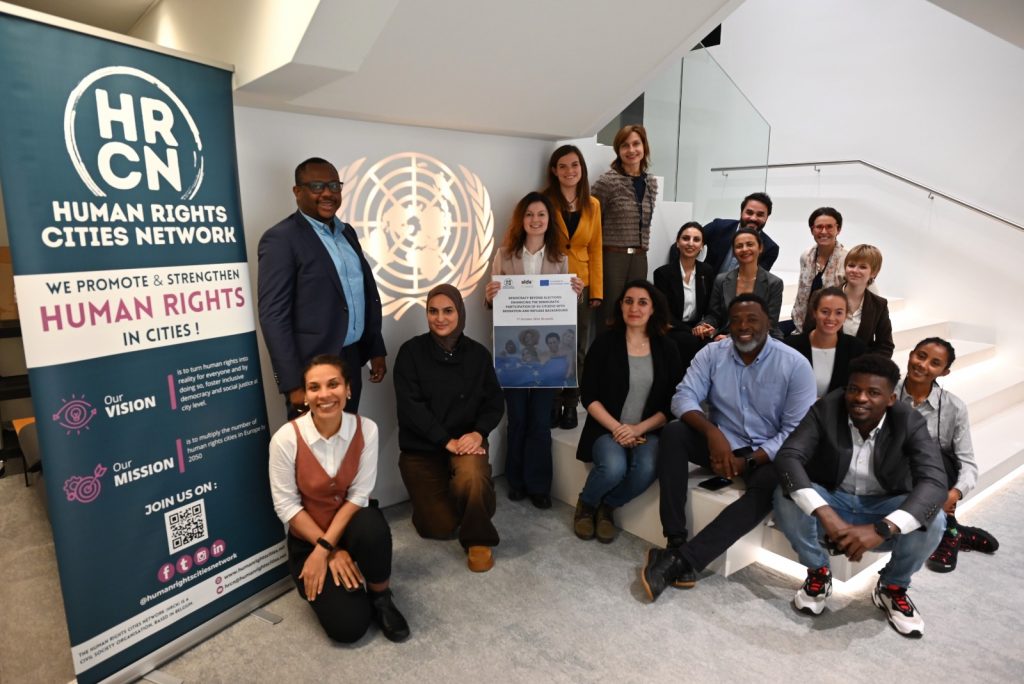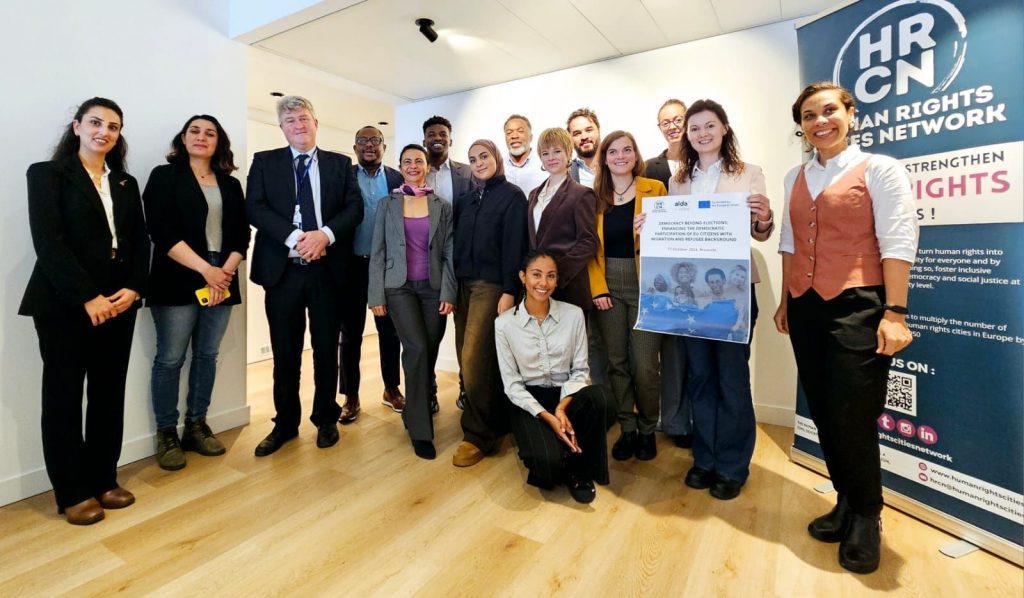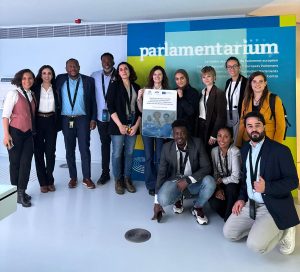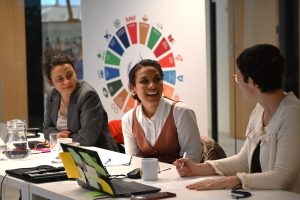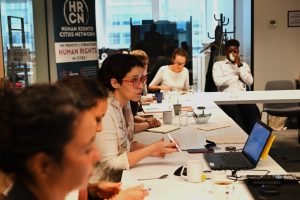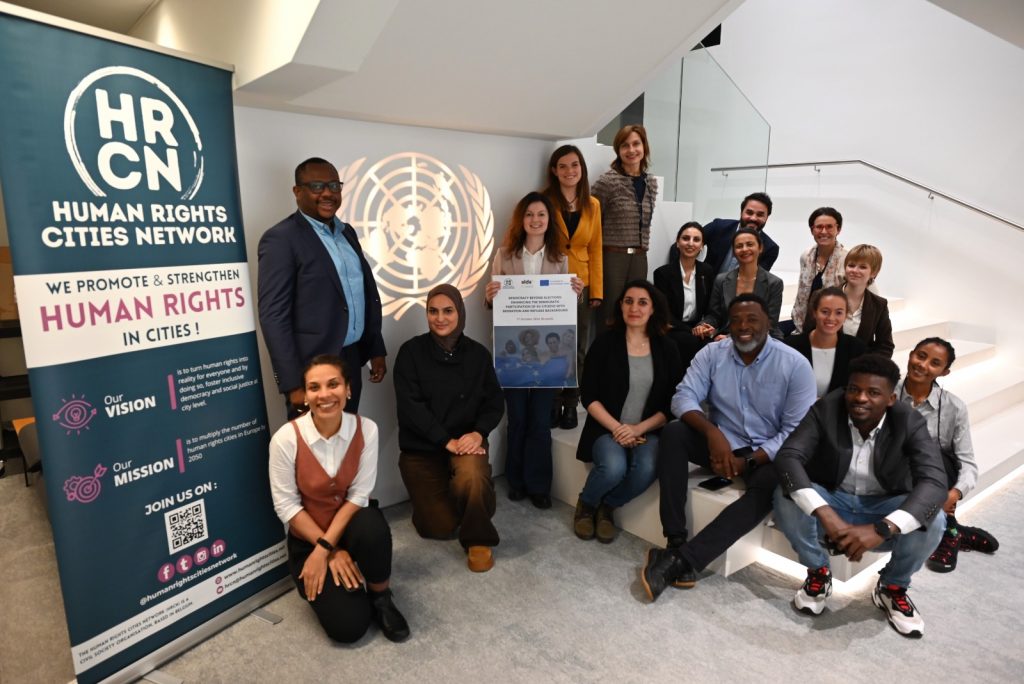Actions speak louder than words, so Human Rights Cities Network invited 10 participants with migration or refugee background from across the European Union to meet and dialogue with EU decision-makers on the 17th of October 2024.
During this exciting day we met with the Irish Renew MEP Michael McNamara, visited the Parlamentarium, and met with Mila Paspalanova, the Anti-Racial Discrimination Advisor at the Office of the High Commissioner for Human rights (OHCHR) Regional Office for Europe.
The participants had space to discuss their experiences and raise challenges for the democratic participation of EU citizens with migration and refugee backgrounds, as well as explore potential solutions. The day was part of our DARE (Democratic Action of Refugees in Europe) project, which aims to ensure that the voices of first-time voters with refugee backgrounds are listened to in the European Elections and beyond.
EU Decision-Making Processes: Key Takeaways from MEP Michael McNamara
During our discussion with the MEP Michael McNamara, held in the European Partnership for Democracy’s office, the role of the European Parliament and the Committee on Civil Liberties, Justice and Home Affairs were explained, allowing the participants to familiarize themselves more with EU decision-making processes. In addition, Mr. McNamara shared good practices from Ireland, such as the use of information campaigns in specific asylum centers so they can register to vote. He highlighted that asylum seekers should be considered as residents and thus should be able to exercise their right to vote in local elections.
Many participants said that they found job application questions discriminatory which makes it difficult for them to find jobs. Some highlighted that despite there being directives, such as the Race Directive which should protect against discrimination based on racial or ethnic origin, the implementation is not equal in all countries. To this point, Mr. McNamara suggested researching which MEP in their countries is involved in anti-discrimination, or on any other issue they wish to raise, and writing to them. He also explained that building networks of civil society organizations can increase their bargaining power and result in a higher chance of action being taken.
Exploring the European Union’s History at the Parlamentarium
The second activity consisted of going to the Parlamentarium to learn more about the history of the EU. The interactive displays allowed for the participants to see how the Union and the core treaties were formed. They also had the chance to look up the MEPs of their countries and familiarize themselves with them. As some participants had previously noted feeling detached from the EU and not understanding its functions, this visit was needed to fill in the gaps and allow them to feel closer to the institution.
Insights from the OHCHR: Human Rights and Participatory Democracy
Given that participating in democracy is a human rights matter, we took the participants to the OHCHR’s Regional Office of Europe to meet the esteemed Mila Paspalanova. During the very interactive session, each participant was given the time to introduce themselves and voice their thoughts. The participants were able to share about their work in the field and learn more from each other, leading to meaningful connections being built. Sharing experiences from different member states gave participants valuable insight into what is happening in other countries, broadening their awareness of diverse challenges and practices.
Ms. Paspalanova also presented the function of the office and shared some valuable monitoring tools designed to hold states accountable regarding their obligations, such as the Human Rights Index. She emphasized the importance of collecting data, as this is needed for funding, although unfortunately many European countries do not allow for the monitoring and collection of certain data, such as on ethnicity. Her insights from her extensive career in the field were invaluable to the participants.
The Importance of Inclusive Dialogue
Creating safe spaces for people with migration and refugee backgrounds to share their experiences and concerns with decision-makers is imperative to ensure that the action taken reflects their needs. Without putting their voices at the heart of the solution and decision-making processes, no real positive change can be achieved.
Reflecting on our events, one participant noted:
“the most important thing about the activity was exchanging ideas with other participants from their lived experience to their academic and civil experience”, underscoring the need for such events. They further emphasized that “the interactive sessions and opportunities for discussion were highly effective” and that “it offered a different perspective compared to the usual approach programs have towards immigrants.”
Another participant stated that they learnt about:
“the importance of the participation of European citizens with a migratory background in the process of democratic change.”
A third participant appreciated that they could ask their
“questions and have the time to exchange with the guests.”
As the DARE – Democratic Action of Refugees in Europe project comes to an end, our commitment to ensuring that the voices of EU citizens with migration and refugee backgrounds are listened to as part of decision-making processes will continue. We will strive to amplify their perspectives and foster a more inclusive dialogue.
*The activity is part of the project DARE – Democratic Action of Refugees in Europe realised by the Human Rights Cities Network with the support of ALDA – European Association for Local Democracy and co-funded by the European Union. The European Commission and ALDA’s support for the realization of this activity does not constitute endorsement of the contents, which only reflect the views of the organisers, and both the Commission and ALDA cannot be held responsible for any use which may be made of the information contained therein.


